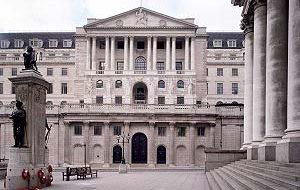MercoPress. South Atlantic News Agency
Keeping inflation on track remains Bank of England's target
 Bank of England
Bank of England The Bank of England's Monetary Policy Committee (MPC) voted Thursday to maintain the official Bank Rate paid on commercial bank reserves at 5.75% but also cautioned it would monitor closely effects of the current credit re pricing on inflation.
The official release states that "it is too soon to tell how far the disruption in financial markets will impair the availability of credit to companies and householdsâ€Ã‚¦the MPC is monitoring closely the evolution of both credit spreads and the quantities of credit extended, alongside all other data relevant to the outlook for inflation". Against that background, "MPC judged that no change in Bank Rate was necessary at this meeting to keep inflation on track to meet the target in the medium term". The MPC August Report projected inflation to remain close to the 2% target over the forecast period and for output growth to ease, reflecting a slowing in both consumer spending and business investment. "In recent weeks, heightened concerns about a variety of asset-backed securities have led to disruption around the world, not only in markets for those financial instruments but also in money markets more generally. The MPC mandate is to set interest rates to meet the Government's 2% target for CPI inflation. So MPC discussed these developments and other economic data in terms of their implications for the outlook for inflation. MPC underlines that CPI inflation fell back to 1.9% in July and may remain around, or a little below, the 2% target for the next few months. Besides pay pressures remain muted and there are tentative signs of a slowing in consumer spending. "But the recent solid pace of output growth has been sustained and the margin of spare capacity appears limited and the indicators of pricing pressure remain somewhat elevated". The decision came as no surprise to markets since the BoE has recently been taking steps to help out banks short of cash following the credit re-pricing sparked by the crisis in the mortgage and housing sectors in United States. This week reflecting current volatility the London Inter-Bank Offered Rate or Libor reached 6.7975% which represents the highest level since December 1998 and is above the BoE emergency lending rate to banks, 6.75%. This suggests banks are reluctant to lend each other and do not want to spare liquidity because of uncertainty about the health of the borrowing bank. Particularly how exposed they might be to the US sub-prime mortgage market since it has gradually emerged that many European banks have bought portfolios of debt that include large amounts of the US sub prime debt. The previous BoE change in Bank Rate was an increase of 0.25 percentage points to 5.75% on 5 July 2007. Minutes of the meeting will be published on Wednesday 19 September, reported the BoE.




Top Comments
Disclaimer & comment rulesCommenting for this story is now closed.
If you have a Facebook account, become a fan and comment on our Facebook Page!